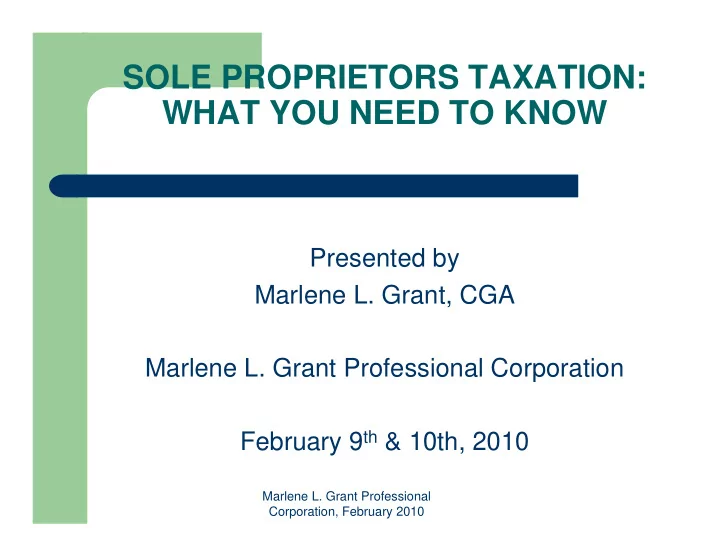

SOLE PROPRIETORS TAXATION: WHAT YOU NEED TO KNOW Presented by Marlene L. Grant, CGA Marlene L. Grant Professional Corporation February 9 th & 10th, 2010 Marlene L. Grant Professional Corporation, February 2010
BRIEF HISTORY ABOUT MYSELF I am the owner of a small accounting practice. Graduated from Algonquin in 1992 and obtained my Certified General Accounting designation in 2002. Over 15 years accounting and taxation experience in the Ottawa area in public accounting as an auditor and controllership positions within the private sector. Work extensively with owner-managed businesses, not-for profit organizations and professionals. Providing accounting, assurance, taxation, business startup assistance and software services to clients. 2009 Nepean Chamber of Commerce award nominee . Marlene L. Grant Professional Corporation, February 2010
SOLE PROPRIETORSHIP A sole proprietorship is an unincorporated business that is owned by one person. It is the simplest kind of business structure. As a sole proprietor: – Pay personal income tax on income. – Register for (GST/HST) if revenues are more than $30,000. – Have 29 days to register for GST once over the $30,000. – May have to register for PST, WSIB & Payroll. – Operate as an individual or as a registered, unincorporated business. – Must maintain proper books and records. Marlene L. Grant Professional Corporation, February 2010
SOLE PROPRIETORSHIP (continued) If using a name other than your own must register with Ministry of – Finance. For a registered business you need a separate bank account . – Include the following with personal income tax return (T1 General): – Financial statements or; T2125 Statement of Business or Professional Activities (For 2008 and future years) If income tax due is >$3,000 will be required to make tax instalments – Instalments are due March 15 th , June 15 th , September 15 th and – December 15 th . More severe penalties for late filing or insufficient instalments. – May have to pay CPP. – Tax returns are due June 15 th and taxes due are payable April 30th – Marlene L. Grant Professional Corporation, February 2010
REGISTERING YOUR BUSINESS Register online, telephone, fax and mail. Complete Form RC-1, Request for Business Number (BN). Before you register for the BN should have the following Info on hand: Your personal information. – The name of the business. – Its location, address, legal structure and fiscal year-end. – What the revenues will be. – Marlene L. Grant Professional Corporation, February 2010
GST COLLECTION, CALCULATION AND REPORTING GST/HST registrant charge 5% GST or 13% HST. Information required on invoice: Business name and address. – Customer’s name and address. – Date of invoice. – Fees payable and GST payable. – The tax rate being charged. – Business number. – Brief description of the goods or services. – CRA Assign the GST reporting period at registration. Personalized GST Returns. Marlene L. Grant Professional Corporation, February 2010
GST COLLECTION, CALCULATION AND REPORTING (continued) Annual filer for taxable revenues less than $1,500,000. GST instalment for taxes payable of $3,000 or more. Prepare and file returns using: – Long method – report GST collected less GST paid. – Quick method – report GST collected only. – Can use the quick method if taxable income is less than $200,000. File and pay your GST via mail, at financial institution, electronically. Can elect to use the Quick Method. Marlene L. Grant Professional Corporation, February 2010
MAINTAINING BOOKS & RECORDS CRA Requires that books and records are properly maintained: To determine if the business is in compliance with the Income Tax Act. Should be in an appropriate form to enable verification. Must be supported by source documents – paper or electronic. Each transaction should be clear and legible. Must be maintained in English or French or another form authorized by CRA. Have to be retained for six years after the tax year they relates to. One of the ways that you can maintain your books is using QuickBooks or Simply Accounting. In order to properly maintain your books and records you will need to understand accounting and bookkeeping. Marlene L. Grant Professional Corporation, February 2010
ELIGIBLE EXPENSES Types of operating expenses Accounting and legal fees – Advertising expenses – Business tax, fees, licenses and dues – Business start-up costs – Home office expenses – Insurance expenses – Interest and bank charges – Meals and entertainment – Motor vehicle expenses – Office expenses – Travel – Telephone expenses – Marlene L. Grant Professional Corporation, February 2010
PERSONAL TAXATION Spousal Pension Income Splitting. Tax-Free Savings Account (TFSA) RRSP & RESP Contributions. Child Fitness Tax Credit. Medical Expense Tax Credit. Federal and Provincial Tax Rates Tax Instalment Payments. Working Income Tax Benefit. Age Credit & Home Renovation Tax Credit Home Buyers Plan & First-Time Home Buyers Tax Credit Marlene L. Grant Professional Corporation, February 2010
PERSONAL TAX RATES Basic personal amount Federal $10,320 & Provincial $8,881 Maximum CPP of $2,118.60 Pension income amount $2,000.00 Federal Tax on taxable income: $40,726 or less taxed at 15% – $40,726 to $81,452 taxed at 22% – $81,452 to $126,264 taxed at 26% – Over $126,264 taxed at 29% – Provincial Tax on taxable income: $36,848 or less taxed at 6.05% – $36,850 to $73,698 taxed at 9.15% – Over $73,698 taxed at 11.16% – Highest marginal tax rate is 46.41% on other income – 23.20% on capital gains – 23.06% on taxable dividends from large corporations – 31.34% on taxable dividends from small corporations – Marlene L. Grant Professional Corporation, February 2010
TOP TEN WAYS A CGA CAN HELP YOU Sound Business Advice. Business Start up. Accounting Services. Controllership Services. Software Installation and training. Systems Implementation. Estate Planning. Financial Planning. Succession Planning. Tax Planning and Preparation. Marlene L. Grant Professional Corporation, February 2010
CONSULTANTS TAXATION: WHAT YOU NEED TO KNOW Presented by Marlene L. Grant, CGA Marlene L. Grant Professional Corporation February 9 th & 10 th , 2010 THANK YOU Any Questions? Marlene L. Grant Professional Corporation, February 2010
Recommend
More recommend